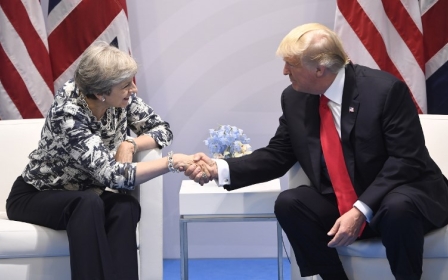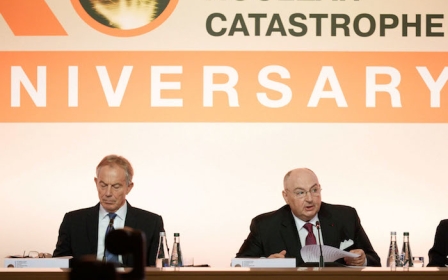Trump decertifies Iran nuclear deal
President Donald Trump defied the will of America's allies and international partners on Friday by choosing not to certify that Tehran is complying with the nuclear deal - in a move that may unravel the landmark agreement and bring the US closer to another conflict in the Middle East.
Trump made the announcement in a bombastic speech that outlined a more confrontational approach to Iran over its nuclear and ballistic missile programmes and its support for extremist groups in the Middle East.
"Today I am announcing our strategy along with several major steps we're taking to confront the Iranian regime's hostile actions and to ensure that Iran never - and I mean never - acquires a nuclear weapon," Trump said.
"We will not continue down a path whose predictable conclusion is more violence more terror and the very real threat of Iran’s nuclear breakout."
While Trump did not pull the United States out of the agreement, aimed at preventing Iran from developing a nuclear bomb, he gave the US Congress 60 days to decide whether to reimpose economic sanctions on Tehran that were lifted under the pact.
He warned that if "we are not able to reach a solution working with Congress and our allies, then the agreement will be terminated".
That would increase tension with Iran as well as put Washington at odds with other signatories of the accord, including Britain, Russia, China, Germany, and France.
Earlier, US Secretary of State Rex Tillerson indicated that Trump planned to decertify Iran, but remain part of the broader nuclear deal.
"Our intention is to stay in the JCPOA (Joint Comprehensive Plan of Action), but the president will decertify," Tillerson said.
"We are not asking Congress to re-impose sanctions, because it would de facto leave the agreement."
But during his speech at White House the US president declared that Iran "remains the world's largest state sponsor of terrorism" and said that the US could leave the deal "at any time".
The speech was immediately welcomed by Israel's Prime Minister Benjamin Netanyahu who praised the "courageous decision" on Iran. It was also welcomed by Saudi Arabia, where the state news agency SPA said the deal had allowed Tehran to develop its ballistic missile program and step up its support for militant groups.
Under US law, Trump has to re-certify the deal every 90 days. Decertification passes the problem to Congress, which, in turn, has 60 days to decide whether to reimpose sanctions on Tehran - a move that would effectively kill the deal.
Republican senators Bob Corker and Tom Cotton on Friday said they had developed legislation intended to address what they saw as deficiencies in the 2015 agreement.
They said their measure, if passed by Congress, would remain in force indefinitely, lead to tougher inspections and automatically reimpose sanctions if Iran is proved to be a within a year of producing a nuclear weapon.
Trump had repeatedly pledged to overturn the nuclear deal, and has derided it as "the worst deal" and one agreed to out of "weakness".
Meanwhile, the Kremlin warned Washington on Friday that abandoning the deal would be a heavy blow to international relations and non-proliferation efforts.
"This could seriously aggravate the situation around the Iranian nuclear dossier," President Vladimir Putin's spokesman Dmitry Peskov told journalists.
"Such actions will unequivocally damage the atmosphere of predictability, security, stability and non-proliferation in the entire world."
Divisions and debates
The outcome "probably reflects more some of the divisions and debates within the administration," said former US Middle East envoy Dennis Ross.
The Iranian nuclear agreement was signed between Iran and six world powers - Britain, China, France, Germany, Russia and the US - at talks coordinated by the European Union.
Since coming to office, Trump has faced intense lobbying from international allies and his own national security team, who argue the deal should remain in place.
UN nuclear inspectors say Iran is meeting the technical requirements of its side of the bargain, dramatically curtailing its nuclear programme in exchange for sanctions relief.
Iran's president, Hassan Rouhani, lashed out at his US counterpart saying he was opposing "the whole world" by trying to abandon a landmark nuclear agreement.
"It will be absolutely clear which is the lawless government. It will be clear which country is respected by the nations of the world and global public opinion," he added.
White House Chief of Staff John Kelly said on Thursday that the US would work with allies in the Middle East to contain Tehran's activities.
"We have footprints on the ground, naval and air force is there to just demonstrate our resolve, our friendship, and try to deter anything that any country out there may do," he said.
In a statement to AFP, leading Republican Senator Marco Rubio described the accord as "fatally flawed" and said he was open to legislation that would "substantially improve America's ability to counter Iran's nuclear, terrorism, militancy and regional threats".
'Mixing everything means risking everything'
US allies have not been convinced by the argument that the deal fell short because it left Iran free to develop ballistic missiles and sponsor proxy militias in its region.
"Mixing everything means risking everything," a French diplomatic source told AFP. "The existential threat is the bomb. The nuclear deal is not meant to solve Lebanon's problems."
Europe fears not only that Iran will resume the quest for the bomb but that the US is relinquishing its leadership role in a stable, rules-based international system.
Speaking before Trump's speech on Friday, UN Secretary-General Antonio Guterres said he "very much hopes" the nuclear deal with Iran can be salvaged.
UN spokesman Stephane Dujarric said Guterres considers the deal to be a "very important breakthrough to consolidate nuclear non-proliferation and advance global peace and security.
"The secretary-general very much hopes that it will remain in place."
“Trump’s speech was a national disgrace. This isn’t an effort to stiff a contractor over a real estate project, it’s a matter of war and peace. Donald Trump is in way over his head.
Trita Parsi, President of the National Iranian American Council, issued a strongly-worded statement criticising Trump's decision.
“Trump’s speech was a national disgrace. This isn’t an effort to stiff a contractor over a real estate project, it’s a matter of war and peace. Donald Trump is in way over his head," he wrote.
“Trump is single handedly destroying U.S. credibility and all but guaranteeing that no country in their right mind would agree to a deal with the U.S. again. The U.S. has shredded alliances through go-it-alone approaches before, to disastrous effect. Trump’s has reduced America’s allies on Iran to just Benjamin Netanyahu and the Saudi royal family. Trump’s ‘coalition of the willing’ on Iran makes George W. Bush’s old coalition on Iraq look like a diplomatic masterstroke", he added.
Stay informed with MEE's newsletters
Sign up to get the latest alerts, insights and analysis, starting with Turkey Unpacked
Middle East Eye delivers independent and unrivalled coverage and analysis of the Middle East, North Africa and beyond. To learn more about republishing this content and the associated fees, please fill out this form. More about MEE can be found here.




